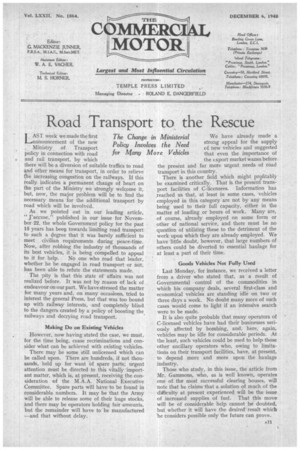Road Transport to the Rescue
Page 13

If you've noticed an error in this article please click here to report it so we can fix it.
LAST week we made the first announcement of the neiv Ministry of Transport• policy in connection with road and rail transport, by which there will be-a diversion of suitable traffics to road and other means for transport, in order to relieve file increasing congestion on the railways. If this really indicates a permanent change of heart on the part of the Ministry we strongly welcome it, but, now, the major problem will be to find the necessary means for the additional transport by road which will be involved.
As we pointed out in our leading article, " jr accuse," published in our issue for November 22, the whole Government policy for the past 15 years has beep towards limiting road transport to such a degree that it was barely sufficient to meet civilian requirements during peace-time. Now, after robbing the industry of thousands of its best vehicles, it is being compelled to appeal to it for help. No one who read that leader, whether he be engaged in road transport or not, has been able to refute the statements made.
The pity is that this state of affairs was not realized before. It was not by reason of lack of endeavour on our part. We have stressed the matter for many years and, on many occasions, tried to interest the general Press, but that was too bound up with railway interests, and completely blind to the dangers created by a policy of boosting the railways and decrying read transport.
Making Do on Existing Vehicles However, now having stated the case, we must, for the time being, cease recriminations and consider what can be achieved with existing vehicles.
There may be some still unlicensed which can be called upon. There are hundreds, if not thousands, held up for want of spare parts; urgent attention must be directed to this vitally Important matter, which is, at present, receiving the-consideration of the M.A.A. National Executive Committee. Spare parts will have to be found in considerable numbers. It may be that the Army will be able to release some of their huge stocks, and there may be operators holding fair amounts, but the remainder will have to be manufactured —and that without delay. We have already made a strong appeal for the supply of new vehicles and suggested that even the importance of the export market wanes before the present and far more urgent needs of road transport in this country. There is another field which might profitably be examined critically. That is the present transport facilities of C-licensees. Information has ,reached us that, at least in some cases, vehicles employed in this category are not by any means being used to their full capacity, either in the matter of loading or hours of work. Many are, of course, already employed on some form or other of national service, and there must be no question of utilizing these to the detriment of the work upon which they are already employed. We have little doubt, however, that large numbers of others could be diverted to essential haulage for at least a part of their time.
Goods Vehicles Not Fully Used Last Monday, for instance, we received a letter from a driver who stated that, as a result of Governmental control of the commodities in which his company deals, several first-class and economical vehicles are standing idle on two or three days a week. No doubt many more of such cases would come to light if an intensive search were to be made.
It is also quite probable that many operators of C-licensed vehicles have had their businesses seriously affected by bombing, and, here, again, vehicles may be idle for considerable periods. At the least, such vehicles could be used to help those other ancillary operators who, owing to limitations on their transport facilities, have, at present, to depend more and more upon the haulage industry. Those who study, in this issue, the article from Mr.. Gammons, who, as is well known, operates one of the •most successful clearing houses, will note that he claims that a solution of much of the difficulty at present experienced will be the issue of increased supplies of fuel. That this move will be of considerable help cannot be doubted, but whether it will have the desired result which • he considers possible only the future can prove. An




















































